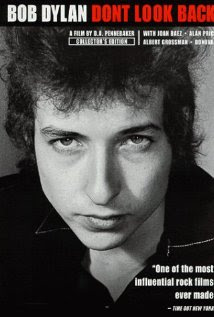Film: Don't Look Back (1967)
Created By: D.A. Pennebaker
Another example we looked at in session was Don't Look Back. This documentary is a great example of a 'observatory mode', as the filmmaker doesn't interact, we merely see the people involved go about their business without awareness or interaction with the film crew. The film follows Bob Dylan as he spends three weeks in England. The camera follows him through the airport to their hall, from the hotel room to public house, from conversation to concert.
This was a very interesting example because there was no interaction whatsoever, you saw the people as if they weren't being watched, giving a personal element to it, as you're digging almost, into another persons life without being noticed. It's almost intrusive of personal space, hiding, to find the information out without any outside influence such as the camera crew and others.
Don't Look Back is an extremely interesting documentary. There are many interpretations as to what the director wanted to create and accomplish with this piece (in addition to working towards an experiment in early cinema-verité, as well as the idea of creating a 'rockumentary'). The film is less about Bob Dylan himself, but more about his work in regard to the art. Don't Look Back shows how a range of events within Dylan's life come together to form his work today, in regard to style influences, and also defend his change from acoustic to electric music.
'Dylan's artistic motivations were not so much the social issues of his time, as many believe. It is worth noting here that Martin Scorcese's excellent follow-up documentary No Direction Home demonstrates this clearly: in one British press conference, a reporter asks Dylan if he'll be attending some widely publicized protest later in the week. Dylan replies coyly, "I think I'll be busy that day." Rather, his musical influences, his poetic abilities and the nature of folk music were a natural musical direction for Dylan to explore. But Dylan saw himself as more than just a musician – he much preferred to be considered an artist. In Don't Look Back, Dylan even lashes out at one reporter (albeit unfairly) for branding him a folk musician. He also claims not to have the answers to social problems that people desperately wanted him to provide: he repeatedly goes into tirades throughout the film about there being "no truth" and that he is merely "painting portraits" of life.' - D.R.J. Demers (IMDB)
I felt more connection to this documentary than the previous ones, even though we weren't technically physically apart of the documentary (observation only), you feel you are invading this life, however by doing so learn a lot more about the person and the subject that the film tries to cover, there's no fake for the camera, merely truths as to what happened backstage to create what was presented to his fans in concert. It's an excellent presentation. I enjoy the fact there is no interaction with the camera, it almost makes you question what everyone is like when they aren't watched? Are they completely different to who they are when they are seen by others/in the spotlight. It opens up a private life and allows you to understand the person behind the art, as well as how the work was created and what was involved in the process, work and personal traits. I enjoyed the work, I think it successfully presented its aim and answered them too, allowing the audience to personally connect and learn about this subject.

No comments:
Post a Comment